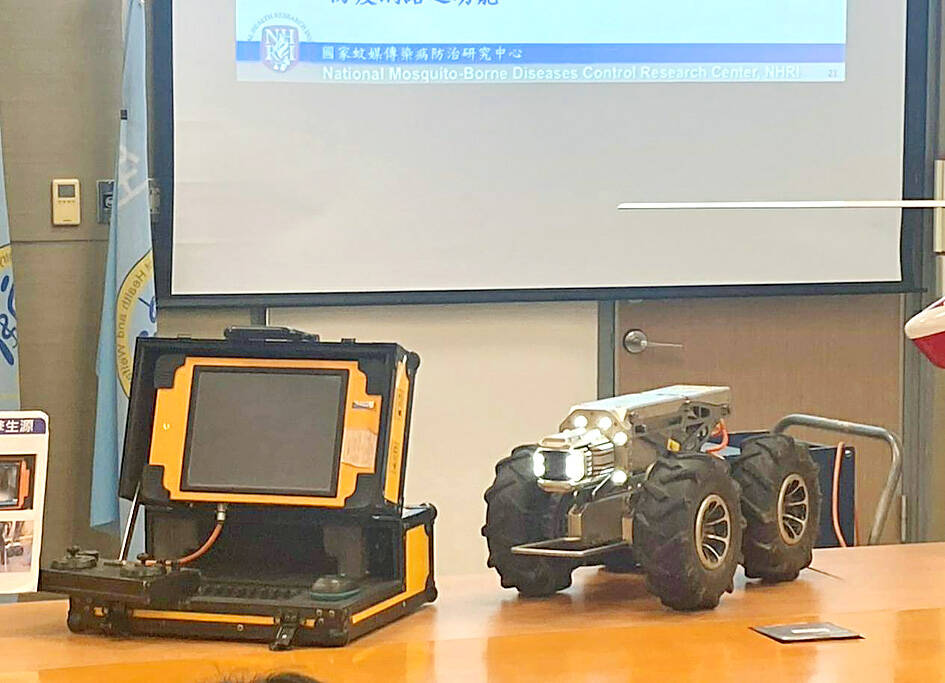The National Health Research Institutes (NHRI) said yesterday that its research team had developed an uncrewed ground vehicle systems capable of entering ditches in urban areas to observe mosquito ecology and effectively apply insecticide for vector control.
More than 8,000 local cases of dengue fever have been reported in Taiwan this year, and as the disease is transmitted to people through the bite of infected mosquitoes, effective vector control is paramount in preventing dengue transmission.
In the past, governments have relied on people to patrol the sewers and ditches for mosquito larvae, which requires a lot of effort and time, but poses a risk to the workers and can miss some hidden breeding grounds, NHRI National Mosquito-Borne Diseases Control Research Center project assistant investigator Liu Wei-liang (劉韋良) said

Photo courtesy of the institute
Liu and the research team collaborated with the Kaohsiung Department of Health and an aerospace technology company to develop uncrewed ground vehicle systems that can enter sewers and ditches to observe mosquito ecology. They have tested it in one of five districts in Kaohsiung from May to August in 2018.
Lui said they found mosquitoes in about 21 percent of the inspected ditches. He added that after deploying another unmanned ground vehicle equipped with high-temperature water spray to clean the larvae breeding grounds and insecticide spray to kill the mosquitoes and larvae, the vector density reduced from 0.62 to 0.19.
The team’s study has been published in the peer-reviewed scientific journal PLOS Neglected Tropical Diseases, titled “Use of unmanned ground vehicle systems in urbanized zones: A study of vector Mosquito surveillance in Kaohsiung” in June.
Liu said as the ground vehicles currently have individual functions, the team is working to further improve the high-resolution digital camera and spraying system, hoping that the functions can be integrated to one vehicle that can effectively and instantly monitor mosquitoes and implement spraying controls.
Max Lo (羅正方), National Drone Industry Association chairman, said the ground vehicles are most suited for monitoring hard-to-reach areas by people, such as inside sewers and ditches, and as technology continues to advance, some vehicles are not only waterproof, but have several other functions.
The team hopes to improve the unmanned ground vehicle systems to include monitoring, cleaning, and insecticide spraying he said, adding that unmanned aerial vehicles are also being used to patrol gutters and water towers on the rook of empty buildings this year, and that the drones can detect standing water and spray insecticide, saving patrol and disinfection manpower.

‘DENIAL DEFENSE’: The US would increase its military presence with uncrewed ships, and submarines, while boosting defense in the Indo-Pacific, a Pete Hegseth memo said The US is reorienting its military strategy to focus primarily on deterring a potential Chinese invasion of Taiwan, a memo signed by US Secretary of Defense Pete Hegseth showed. The memo also called on Taiwan to increase its defense spending. The document, known as the “Interim National Defense Strategic Guidance,” was distributed this month and detailed the national defense plans of US President Donald Trump’s administration, an article in the Washington Post said on Saturday. It outlines how the US can prepare for a potential war with China and defend itself from threats in the “near abroad,” including Greenland and the Panama

A wild live dugong was found in Taiwan for the first time in 88 years, after it was accidentally caught by a fisher’s net on Tuesday in Yilan County’s Fenniaolin (粉鳥林). This is the first sighting of the species in Taiwan since 1937, having already been considered “extinct” in the country and considered as “vulnerable” by the International Union for Conservation of Nature. A fisher surnamed Chen (陳) went to Fenniaolin to collect the fish in his netting, but instead caught a 3m long, 500kg dugong. The fisher released the animal back into the wild, not realizing it was an endangered species at

The Chinese Nationalist Party (KMT) is maintaining close ties with Beijing, the Democratic Progressive Party (DPP) said yesterday, hours after a new round of Chinese military drills in the Taiwan Strait began. Political parties in a democracy have a responsibility to be loyal to the nation and defend its sovereignty, DPP spokesman Justin Wu (吳崢) told a news conference in Taipei. His comments came hours after Beijing announced via Chinese state media that the Chinese People’s Liberation Army’s Eastern Theater Command was holding large-scale drills simulating a multi-pronged attack on Taiwan. Contrary to the KMT’s claims that it is staunchly anti-communist, KMT Deputy

The High Prosecutors’ Office yesterday withdrew an appeal against the acquittal of a former bank manager 22 years after his death, marking Taiwan’s first instance of prosecutors rendering posthumous justice to a wrongfully convicted defendant. Chu Ching-en (諸慶恩) — formerly a manager at the Taipei branch of BNP Paribas — was in 1999 accused by Weng Mao-chung (翁茂鍾), then-president of Chia Her Industrial Co, of forging a request for a fixed deposit of US$10 million by I-Hwa Industrial Co, a subsidiary of Chia Her, which was used as collateral. Chu was ruled not guilty in the first trial, but was found guilty